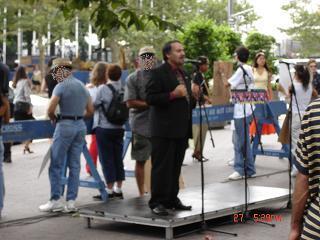Years after fleeing persecution in Iran, Bahais still know fearRefugees recall retaliation, worry about relatives.
By Eileen E. Flynn
American-Statesman Staff
Friday, July 08, 2005
Face down on the ground outside a police station in southeastern Iran, blindfolded and with ankles bound, Farzad Kasiri raised his voice in an absurdly sincere attempt to reason with his tormentors.
"Why?" he bellowed. "Why are you doing this?"
The men, he says, stuffed a dirty rag in his mouth and continued to flog his bare feet. The answer is as clear to Kasiri now as it was 22 years ago in that police station parking lot. The Islamic revolutionaries who came to power in the late 1970s after deposing the Iranian monarch targeted thousands of people, he says, because they followed the Bahai faith, a religion that emerged in the 19th century with the belief that the world's major faiths are progressive revelations from God.
"They had a plan to kill us all," says Kasiri, 54, who is now an Austin shoe salesman.
A national spokeswoman for Bahais in the United States says the persecution has continued since the revolution.
"It is the policy of the Iranian government to do whatever it has to do . . . to eliminate the Bahai community," said Kit Bigelow, director of external relations for the National Spiritual Assembly of the Baha'is of the United States.
Now, as the U.S. government keeps a close eye on Iran's newly elected president, religious conservative Mahmoud Ahmadinejad, Iranian Bahai refugees are praying that conditions will not worsen for family members they left behind.
They have reason to worry, Bigelow said. In recent months, the situation has deteriorated for the country's estimated 350,000 Bahais, Iran's largest non-Muslim minority, with the destruction of holy sites and cemeteries and an increase in arrests of Bahais.
Since the 1978 overthrow of Shah Mohammad Reza Pahlavi and the establishment of a Shiite Muslim theocracy under Ayatollah Khomeini, Bigelow said, the government has executed more than 200 Bahais and forbidden Bahais from openly practicing their faith, attending college and receiving equal legal treatment.The U.S. State Department's Web site chronicles the Iranian government's mistreatment of its Bahais, and American leaders, starting with President Reagan, and the United Nations have called on Iran to restore their rights.
Although the Iranian constitution recognizes Zoroastrianism, Judaism and Christianity, all of which predate Islam, the government regards the Bahai Faith as heresy and does not officially acknowledge the religion, said Reza Afshari, professor of history and human rights at Pace University in New York.
"No one has suffered as much as the Bahais in the last 25 years," he said.
In the Northwest Austin apartment that he shares with his wife, Kasiri recounts the details of his interrogation, torture and three-month imprisonment. His strong features darken. He is silent for a few minutes, eyes watery and mouth slightly agape as he struggles to control the building anguish.
Kasiri says his captors beat him, threatened to execute him and at one point sent in a Muslim cleric in an effort to convert him. He was finally able to return home, he says, thanks to a sympathetic guard who told him, " 'I have a lot of Bahai friends. I love Bahais.' "
But even after his release, the situation was untenable. The government, he says, seized his family's 100-acre farm in Babolsar, near the Caspian Sea. He fled to Pakistan in 1984, obtained religious refugee status and moved to Austin a year later.
"What they have done to me is not acceptable," he says of the government, but he stops short of making what could be perceived as a political statement.
For many Bahais, even a quarter of a century after fleeing, even after finding safety and comfort in the U.S., fear of retribution persists. Two Austin Bahais asked not to be named for this article because they are afraid that the Iranian government would retaliate against their family members.
"The political situation is very unstable," said one man who recently traveled to Iran to visit relatives. "Nobody knows exactly what's going to happen six months to a year down the road in Iran."
Another Austin Bahai, a woman who said that her mother was imprisoned and father was executed within a year of the revolution, said she worries about what will happen to relatives in Iran. The damage done to her immediate family, she said, is immeasurable.
She was 13 in 1979 when she boarded the "last flight out of Tehran." The shah had just fled, and Khomeini was on his way back.
"You could feel it. It was like a storm that was coming," she said.
Months later, living in the United States, the woman received a call from her father, who urged her to look after her brother and pursue her education, she said. She "knew that something horrible was about to happen."
A short time later, she dreamed of her father's execution. But she could not confirm he was dead until three years later.
"While this was going on, the world just went on," she said. "That was the oddest thing. Why was the world not stopping and taking notice and helping?"
















